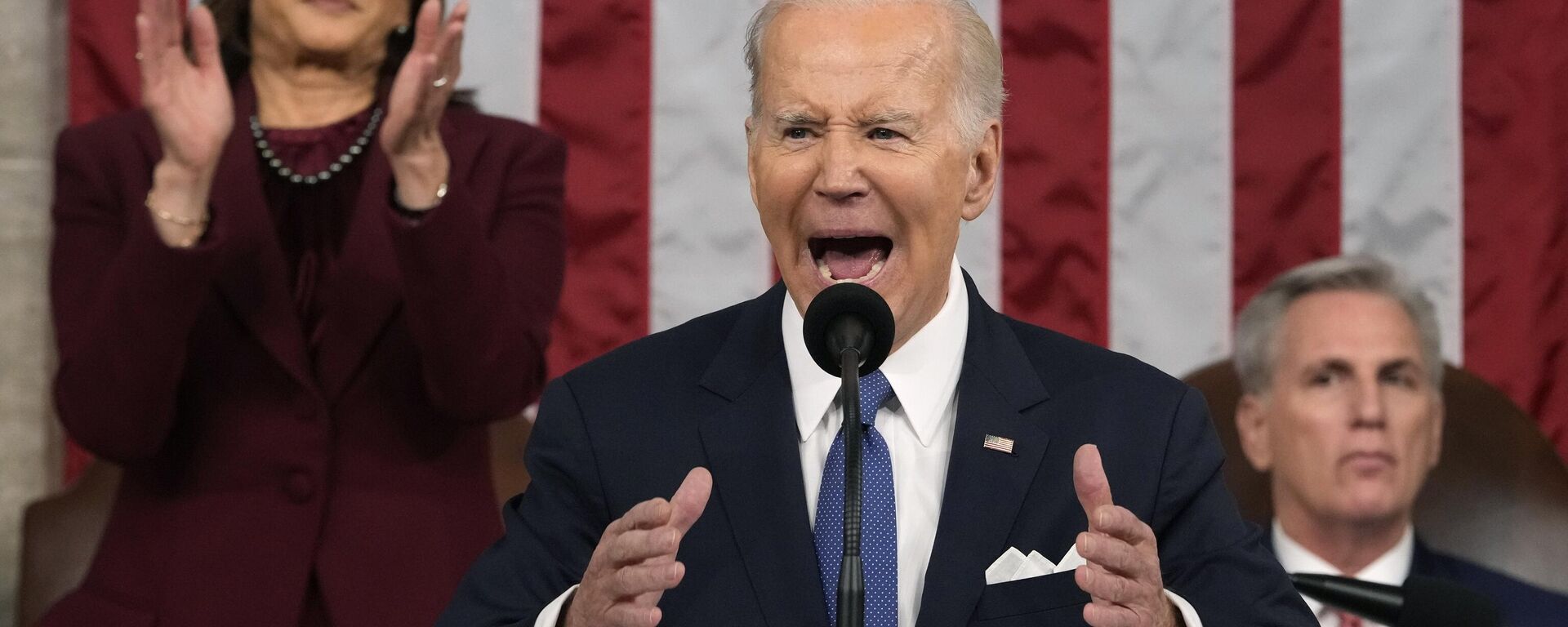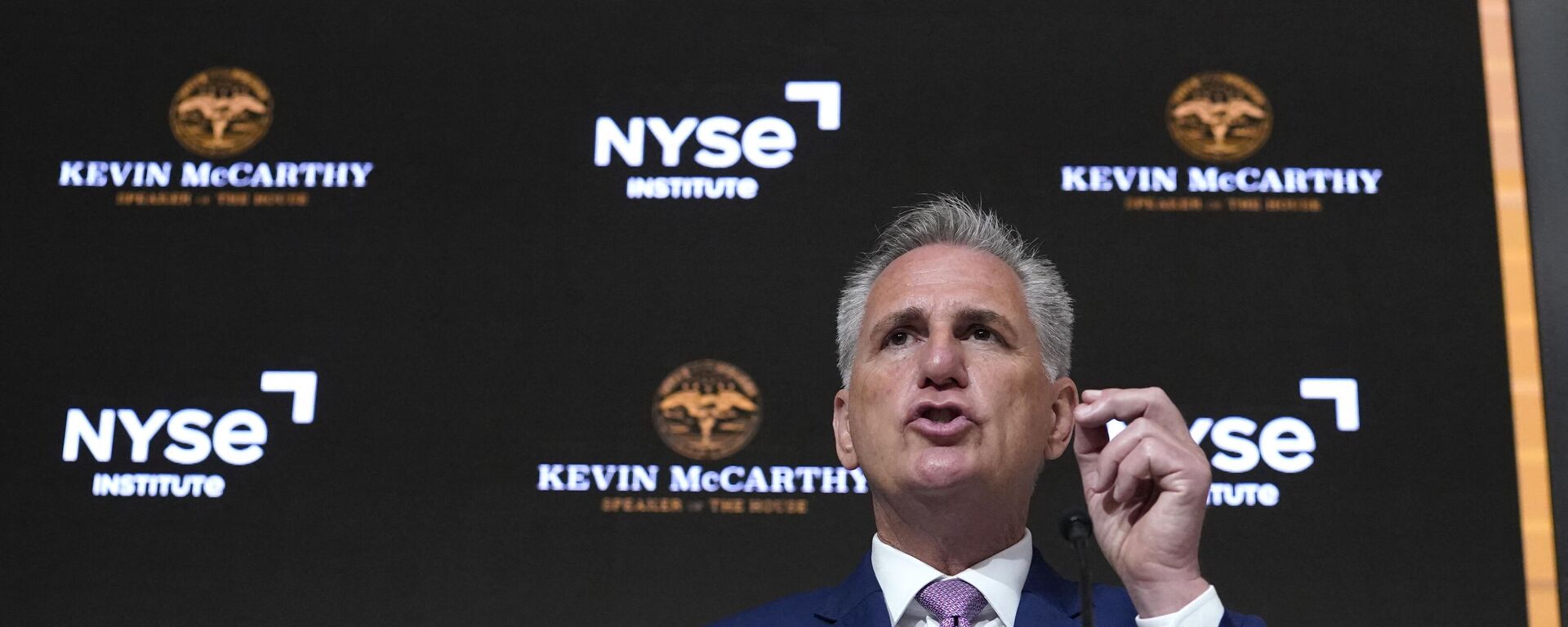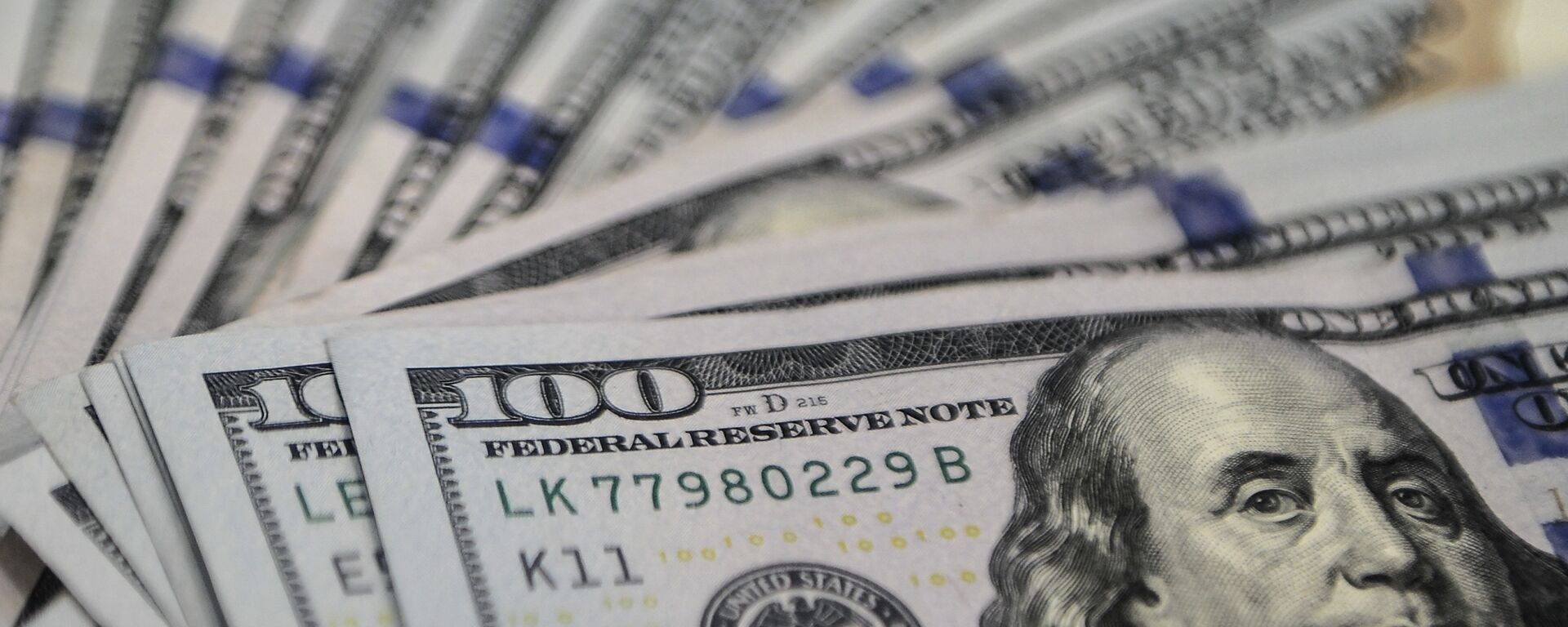https://sputnikglobe.com/20230502/a-us-default-would-cause-systemic-financial-crisis-destabilize-global-economy-1110038307.html
US Default Would Cause Systemic Financial Crisis, Destabilize Global Economy
US Default Would Cause Systemic Financial Crisis, Destabilize Global Economy
Sputnik International
A US default may destabilize the global economy with a series of domino effects, Sergio Rossi, professor of macroeconomics and monetary economics at the University of Fribourg, Switzerland, told Sputnik.
2023-05-02T17:28+0000
2023-05-02T17:28+0000
2023-05-03T10:00+0000
analysis
us
treasury
federal reserve
janet yellen
joe biden
us constitution
debt limit
debt ceiling
us debt ceiling crisis
https://cdn1.img.sputnikglobe.com/img/105414/19/1054141993_0:374:5400:3412_1920x0_80_0_0_498b00536956c49ca062364516f6fe8e.jpg
Treasury Secretary Janet Yellen informed US lawmakers that the government could run out of cash to pay its bills as early as June 1 on Monday. The US hit that limit – $31.4 trillion – on January 19, 2023, but the Treasury has undertaken measures to buy time for lawmakers to raise the debt ceiling. If the borrowing limit isn't increased, the US could default, Yellen warned. She also depicted some of the gloomy consequences of the potential crisis that could include severe hardship to American families, upended US global leadership, and damage to the nation's security interests. Is Yellen's alarmism justified?At the same time, Rossi drew attention to the fact that "be that as it may, the US cannot default": the Federal Reserve can refinance the US federal government without any budget constraint for it, since it can issue as much money as it will in this regard, according to the economist. Indeed, even the US Constitution makes debt default impossible, by stating that "the validity of the public debt of the United States, authorized by law (…) shall not be questioned." in this context, the forthcoming meeting between US President Joe Biden and top congressional leaders should translate into some sort of bipartisan compromise to avoid further troubles.Meanwhile, the US national debt has grown by roughly $25 trillion since 1993 and is continuing to go up. Interest payments on the national debt were $475 billion in fiscal year 2022 and are projected to grow by another 35 percent in 2023. According to some estimates, the US debt-to-GDP ratio amounts to around 133% making it the 12th most indebted country in the world, and the fourth most indebted economy among developed countries. Meanwhile, earlier this year, some House Democrats proposed legislation that would eliminate the debt ceiling altogether to allow unlimited government borrowing. How sustainable is it for America to keep increasing its national debt?For more insight from professor Rossi, check out our Telegram channel!
https://sputnikglobe.com/20230502/bidens-vandals-will-destroy-us-if-gop-loses-debt-ceiling-fight--1110034996.html
https://sputnikglobe.com/20230428/us-debt-ceiling-bill-wont-stop-government-deficit-soaring-by-tens-of-billions-1109916231.html
https://sputnikglobe.com/20230501/us-may-hit-debt-limit-as-early-as-june-1-if-congress-fails-to-act-yellen-warns-1110016104.html
Sputnik International
feedback@sputniknews.com
+74956456601
MIA „Rossiya Segodnya“
2023
News
en_EN
Sputnik International
feedback@sputniknews.com
+74956456601
MIA „Rossiya Segodnya“
Sputnik International
feedback@sputniknews.com
+74956456601
MIA „Rossiya Segodnya“
us debt ceiling, us borrowing limit, biden debt ceiling, biden mccarthy debt ceiling talks, us default on debt, us systemic financial crisis, global financial crisis, us market turmoil, us national debt, us deficit, us default to affect financial markets, janet yellen warning, us treasury, us government
us debt ceiling, us borrowing limit, biden debt ceiling, biden mccarthy debt ceiling talks, us default on debt, us systemic financial crisis, global financial crisis, us market turmoil, us national debt, us deficit, us default to affect financial markets, janet yellen warning, us treasury, us government
US Default Would Cause Systemic Financial Crisis, Destabilize Global Economy
17:28 GMT 02.05.2023 (Updated: 10:00 GMT 03.05.2023) A US default could destabilize the global economy with a series of domino effects, in particular across financial markets, Sergio Rossi, professor of macroeconomics and monetary economics at the University of Fribourg, Switzerland, told Sputnik, while commenting on Treasury Secretary Janet Yellen's gloomy economic projection.
Treasury Secretary Janet Yellen informed US lawmakers that the government could run out of cash to pay its bills as early as June 1 on Monday.
The US hit that limit – $31.4 trillion – on January 19, 2023, but the Treasury has undertaken measures to buy time for lawmakers to raise the debt ceiling. If the borrowing limit isn't increased, the US could default, Yellen warned. She also depicted some of the gloomy consequences of the potential crisis that could include severe hardship to American families, upended US global leadership, and damage to the nation's security interests. Is Yellen's alarmism justified?
"If the US fails to pay its debts, there will be a systemic financial crisis, particularly because the US dollar is a so-called key currency in the global economy," said Sergio Rossi. "A former US Treasury Secretary told Europe that ‘the US dollar is our currency, but your problem’, since the 1944 Bretton Woods agreements put this currency at the core of the international monetary regime. Hence, any US default will destabilize the global economy with a series of domino effects, in particular across financial markets that would induce a dramatic global crisis, with a series of negative consequences for several banks and non-bank financial institutions, small and medium-sized firms as well as transnational corporations across the world."
At the same time, Rossi drew attention to the fact that "be that as it may, the US cannot default": the Federal Reserve can refinance the US federal government without any budget constraint for it, since it can issue as much money as it will in this regard, according to the economist. Indeed, even the US Constitution makes debt default impossible, by stating that "the validity of the public debt of the United States, authorized by law (…) shall not be questioned."
Thus, in the event of a debt ceiling breach, the government should prioritize debt service payments by cutting back on other expenditures. However, some American economic experts argue that the US government has defaulted on its debt obligations at least three times (in 1933, 1968 and 1971). Given the blemished credit record, the game of chicken played by American lawmakers could send shivers up the global market and rock the boat, according to them.
in this context, the forthcoming meeting between US
President Joe Biden and top congressional leaders should translate into
some sort of bipartisan compromise to avoid further troubles.
"In the absence of such an agreement, to be sure, there will be a systemic financial crisis originating again in the US, with a series of negative consequences both for the US and the global economy," Rossi stressed.
Meanwhile, the US national debt has grown by roughly $25 trillion since 1993 and is
continuing to go up.
Interest payments on the national debt were $475 billion in fiscal year 2022 and are projected to grow by another 35 percent in 2023. According to some estimates, the US debt-to-GDP ratio amounts to around 133% making it the 12th most indebted country in the world, and the fourth most indebted economy among developed countries. Meanwhile, earlier this year,
some House Democrats proposed legislation that would eliminate the debt ceiling altogether to allow unlimited government borrowing. How sustainable is it for America to keep increasing its national debt?
"The sustainability of US public debt depends on two issues," said Rossi. "On the one hand, this has to do with the object of increasing public debt: if this occurs for investment purposes – particularly as regards healthcare, public transports, education and a properly-defined ecological transition, it will increase produced output as well as social cohesion and the employment level, which will allow the US federal government to reimburse this debt eventually. On the other hand, much depends on the US monetary policy stance, to wit, on the evolution of the policy rates of interest decided by the Federal Reserve, which in both the short and long run affect all market rates of interest, hence also the interest rate the US government must pay to its bondholders. If this rate increases over time, as one can note in this period, then a larger share of public expenditures is dedicated to such a debt service, thereby reducing the amount of tax income the government can really use to finance its provision of public goods and services such as healthcare and education (…) If the Federal Open Market Committee (FOMC) decides to raise interest rates again in the US, it will further aggravate the situation, first across the financial sector, then also in the economy as a whole – both in the US and across the global economy."
For more insight from professor Rossi, check out our Telegram channel! 




